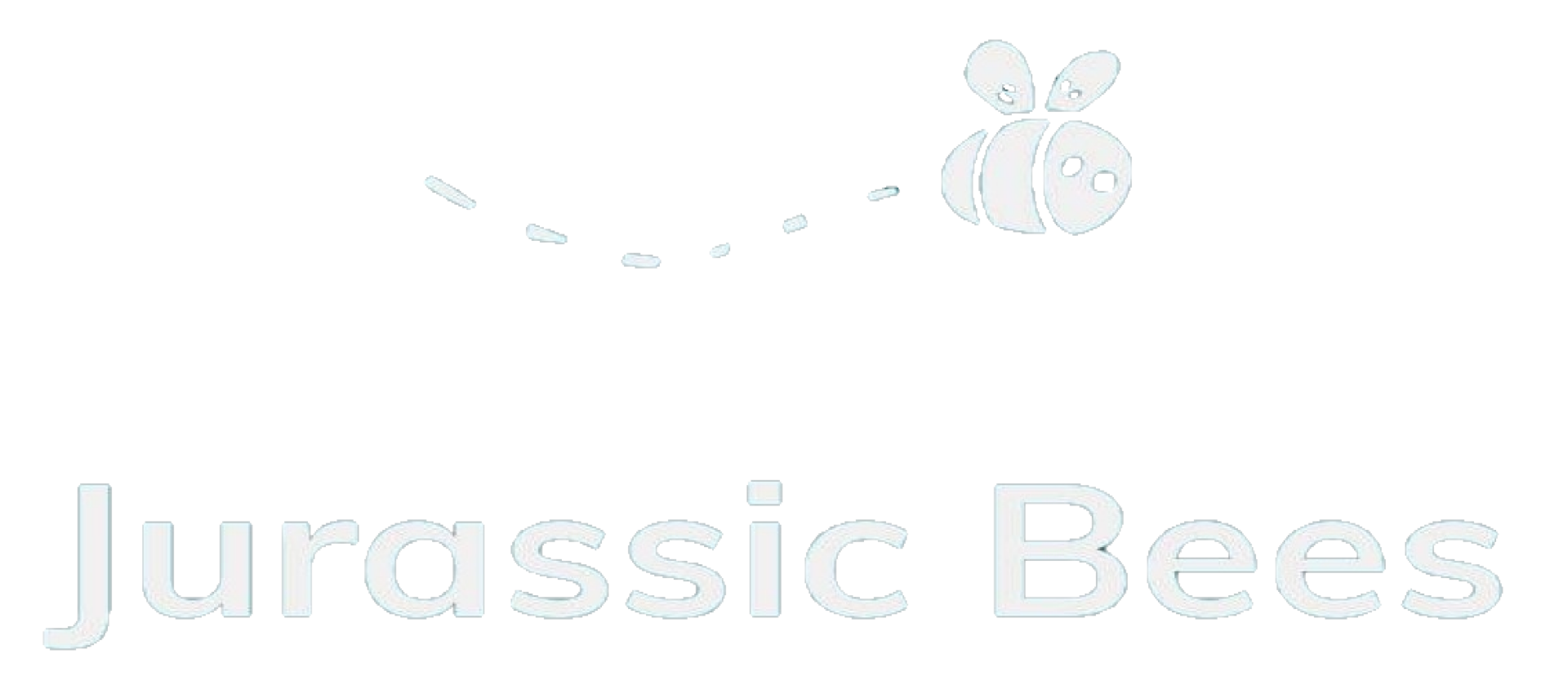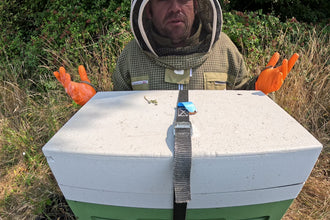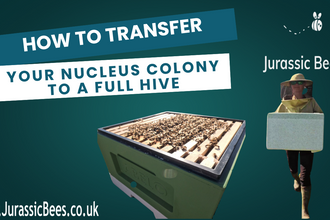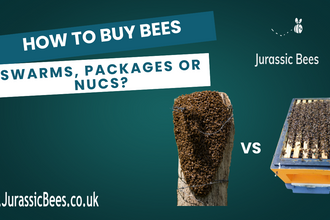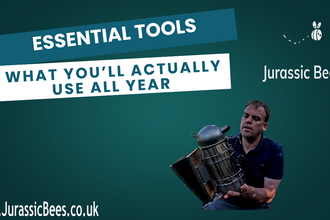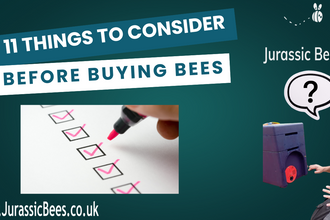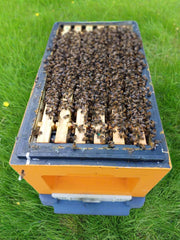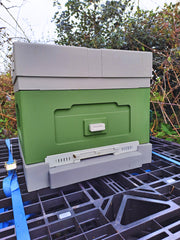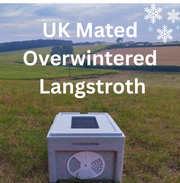Beekeeping is one of the most incredibly rewarding hobbies. For me, it provides a fascinating glimpse into the world of the honey bee. Learning how this little insect has evolved over its 2 million years is mind blowing! One other unexpected benefit is the closer ties to nature this hobby brings. Once you keep bees, you will always have one eye on the environment, sussing out what’s in flower, what the bees are foraging on and the general health of your surroundings.
If that’s not enough, we also have the bonus of delicious, home-harvested honey!
However, one question I often get asked by new bee’s looking to enter this amazing world is “How much will this cost”? So, before diving into this unique pastime, it's essential to understand the initial costs involved. Let’s break down the expenses of getting started with beekeeping, including everything from the bees themselves to the equipment you'll need.
Initial Costs of Beekeeping Equipment
| Item | Cost (GBP) |
| Nuc of Bees | £330 |
| Beehive | £200 |
| Frames and Foundation | £50 |
| Bee suit | £100-£160 |
| Smoker | £20 |
| Hive Tool | £10 |
Let’s go into more detail about each of these items and what you can expect.
A "nuc" (short for nucleus) is a small, established colony of bees that includes a queen, workers, and a few frames of brood (eggs, larvae, and pupae). This is a great way for new beekeepers to start as it’s a manageable-sized colony with bees already accustomed to working together under a queen. Expect to spend around **£330** for a healthy nuc. There are other ways that you can start, for example by catching a swarm, but in truth, this is far less reliable. The beekeeper doesn’t know what they are getting or even when they are getting them!
With a well bred Nuc, the colony is already a thriving community, they are verified as being disease free and (providing you select the right provider) the bees will be as guaranteed as possible that they are clam and productive bees.
There is a huge amount to learn when you are just starting out, so, in my experience, you are always better of starting with a Nuc and all the benefits one provides, particularly for your first year!
Bee Hive - £200
The hive will be your bees' home and is where they’ll store honey, raise young, and rest. There are many different types of bee hives. The two most popular in the UK are the British National and the Langstroth.
The national is by far the most popular in the UK, and the Langstroth the most popular across the world.
Then you have the choice between wood and poly hives. Now this is where personal choice comes into it. The wood hives are sturdy, strong and have been used for decades. However, a more recent trend is poly hives. These are strong, long lasting, light weight and have the added benefit of insulation. In my opinion, the advantages the poly hive brings with regards to its insulation makes it the worthy choice. Many will argue the point that insulation isn’t necessary (and they may be right) however, in my mind a tree trunk (the natural home for a honey bee) provides an insulation factor (Called the R value) of >30, a wooden hive is around 1 and a poly hive is around 7.
There is also an added benefit of what is known as a condensing hive. In the winter, far more important than heat is moisture! Damp kills bees. A poly hive has a much better advantage since the condensation forms on the side walls, whereas a wooden hive the insulation forms on the roof.
In short, my choice is poly every time, but I also know plenty of people with wooden hives that do well. Just make sure the wooden hive is Cedar and definitely not pine and consider adding insulation to the roof of the hive.
A beginner-friendly beehive, such as the Abelo 12 frame hive (my particular favour), typically costs about £200 for a brood box and 2 supers. Everything you need for your first year!
We often find that with the bees we supply, 2 supers are not enough, more likely 4 will be needed. But since the Nuc will need to expand and draw out the additional 6 frames in the brood box and the frames in the supers, 2 is likely to be sufficient for your first year.
Frames - £50
Frames go inside your hive and give bees a structure on which to build their wax comb. A set of frames will usually cost around £50. Some hives come with frames included, but you might need extras or replacements over time. Buying frames as needed can also help spread out costs. Remember, if you purchase our Nuc's then they already come with 6 frames!

Bee Suit - £50-£160
Safety is essential, especially when you’re starting out, so investing in a good-quality bee suit is a must. A suit will protect you from stings, allowing you to interact with your bees with confidence.
At Jurassic bees, we use two types of suits. Our primary one is an Oz Armour suit, which is great. It is virtually sting proof (though I have been stung through one) and is priced at the lower top end around £160. This is a full body suit, covering legs arms and head all in one. For a beginner that is defiantly something I suggest.
We also use a cheapo, £40 smock and veil. We use these when we are carrying out less intrusive activities. Maybe feeding, inspecting small nucs or other such tasks. However, when we are doing full inspections on full colonies, with 3 or 4 supers….we choose the full body suit every time!

Smoker - £20
A smoker is a crucial tool that helps calm the bees, making hive inspections easier and safer. It produces a cool smoke that disrupts the bees' alarm pheromones, allowing you to work without causing too much stress to the colony. Smokers are fairly inexpensive, around **£20**, we have used in the past these cheap smokers quite happily. There are more expensive ones (like the Dadant at £100) but it is just not necessary, especially for the first year.

Hive Tool - £5
Finally, a hive tool is essential for prying open the hive and separating the frames, which bees tend to glue together with propolis (a sticky resin they produce). This tool is inexpensive, at around **£10**, but invaluable for hive maintenance. There are two types, the traditional and the J hook. I bought two for £10 to see which I prefer working with and I much prefer the J hook type, though many others find the more traditional type to their preference.

Total Start-up Cost for a beginner beekeeper
Based on the prices above, the total cost to start beekeeping ranges between **£680 and £740**, depending on the type of bee suit you choose:
- Low End:** £710
- High End:** £800
It should be noted, that these start-up costs are a one-off investment. The suit and hive will last many years if looked after. In fact, I know of plenty of hives well into 20 years old!
Additional Considerations when starting Beekeeping
Ongoing Beekeeping Maintenance and Supplies
Beekeeping has ongoing costs, including feeding your bees sugar syrup in early spring or late fall and replacing old dirty combs with new frames and foundation. You might also need to treat your bees for pests like varroa mites, which requires specialized treatments. You can expect to spend around £30 for treatment (that is for a pack that can treat 5 hives unfortunately, thy seem to only come in multipacks) or, you can use various forms of Integrated Pest management (IPM’s), such as forced brood breaks, which my experience has shown often has a better reduction in Varroa mites than conventional miticides like Apivar.
If you are interested in this approach, for our customers we offer full guidance throughout the season and will be demonstrating this approach alongside a treated hive for full comparison, so our customers can make their own informed judgment on what suits them.
Joining a local beekeeping association can be an invaluable resource for learning and connecting with other beekeepers. However, I must add that many of the best Beekeepers I know have never been a member of any associations. In fact, some of the best ones I know reported that they much preferred learning on the job so to speak. Today, there is so much information widely available to anyone who wishes to learn a new skill. That’s the way I prefer to learn, by taking into account the wide range of views, opinions and approaches, and then making an informed choice myself. One remark I often hear is how the local association has a method, and discourage new members from straying away from the only approach they are teaching. So give some thought on how you best prefer to learn.
Training or Beekeeping Classes
Investing in a beginner’s course or training workshop can save you money in the long run by helping you avoid common mistakes. Most courses have a fee and it is usually expected to attend the course before you get bees.
We offer our customers a slightly different approach. We offer full 7 day a week support direct to a bee farmer who is available to you for when you have questions or concerns. Alongside this, we have a range of videos filmed for our customers showing them the different options, the pros and cons of each and monthly guidance on what the focus of the month will be for the Bees and keeper alike. We also have Nucs each year that we develop into production hives that we use as demonstrations so you can see where your colony should be and what you can expect.
Honey Extraction Equipment
Now, it is often said that you don’t get honey in your first year, or that the first year’s honey is for the Bees. Well, if we use our own Nucs as an example, I am here to say that is wrong! Or at least if you use our Nucs that is wrong!
From our Overwintered or spring Nucleus colonies, it is my experience that customers more often than not report 2 or 3 supers full of honey. We don’t leave supers on over the winter. We remove them in August, harvest the honey and leave the bees to fill their brood nest with more than adequate stores for the winter.
So, with that in mind, what you are going to do with all that honey is something you need to consider. It’s all very well collecting 2 supers of honey, but unless you can extract it…you have a problem on your hands!
Well, there three options to this that need thought upfront:
- Purchase an extractor. You can get cheap extractors for around £150. That is an option
- Use or borrow someone else’s. Many associations do hire extractors, but be aware! Everyone will be queuing up to use the extractor all at the same time of year. That causes a problem since when you need to extract, you need it now. Not 2 or 3 weeks down the line when every other person has used it.
- The final option, and one that is a pretty good option for your first year is to crush and strain the honey. This is done by scraping off the beeswax combs into a crusher (a potato ricer or similar) then straining the honey from the wax. This is actually a surprisingly efficient method (though can be a little sticky). However, one thing to note, is that if this is your chosen method, then make sure you purchase unwired wax foundation rather than wired foundation that is the preferred choice when extracting in a spinner. The wire is critical if you are using centrifugal force to stop the combs “blowing out”, however the wires do nothing but get in the way if you are using the crush and strain method.

A Backup plan!
So, you have got this far, you have taken a look at the various hive options, figured out what bee suit to purchase and have jumped straight in. Perfect!
But here is the risk. At this point you only have 1 hive. The entire investment is pinned on this one hive, in fact, it is pinned on 1 queen.
Consider all the potential downfalls. Perhaps the colony swarms, we get a few weeks of bad weather and the virgin queen doesn’t get out to mate. Or perhaps the queen gets invertedly killed. Or perhaps the colony simply decides they don’t like their new home and absconds. Well, with just one hive, all of your eggs are in one basket.
So, here is what we suggest to our customers. We promote that with our guidance the customer can end their first year being self-sufficient, with a backup plan. For us, this means taking a split, and making a separate nucleus colony.
If you have purchased a Nuc from us, you already have either the paynes or abelo poly nuc ready to go, so besides 6 frames there is no need to purchase anything else.
In fact, for our 2025 Nuc customers, we offer as many virgin queens as reasonably needed so that your new nuc of bees is headed by a top-quality queen, mated by you, in your local area. We provide the queen and the guidance. All you have to do is set up the nuc box!
So, what benefits does this bring? Well, you have a 2nd hive! So straight away, should one fail. At least your entire investment is not lost. That’s great! The risks are reduced by half. But wait, that’s not even the best thing. With a 2nd colony, you now have resources you can share.
For instance, should your hive swarm, and a virgin queen fails to return from her prenuptial flights….well, that could spell then end of that colony. By this time, there would be no eggs or larvae in the hive for which the colony can raise a new queen. They would be effectively doomed without intervention. But with a nuc on standby, it’s no problem! Simply find a frame with young eggs and larvae, pop it in the swarmed hive and leave the bees to it! They now have the resources to raise a new queen.
What’s more, you will be going into winter with a full-sized hive and nucleus colony. Fingers crossed, in the spring you come out winter with two healthy colonies. You have 2 queens and plenty of options.
- Want another bee hive? No problem, just grow transfer the nucleus into the beehive.
- Want to requeen your older queen? Also, no problem, you have a spare available.
- Want to stick to just one hive? Also, not problem, just kill one queen and combine the hive and the nuc, which will result in an even bigger foraging force ready to collected all that amber nectar!
You can clearly see just why we believe it is so important that in the first year especially, Beekeepers learn to become self-sufficient. That’s exactly why we offer this service to all of our customers for Nucs in 2025.
Final Thoughts
While the start-up costs for beekeeping may seem high, they’re generally a one-time investment. Once you have the essential gear, your annual expenses will mostly involve maintaining the hive and replacing consumables. Plus, beekeeping can be a truly enriching hobby that brings you closer to nature, offers mental relaxation, and even helps the environment by supporting local pollination.
Just remember….Get yourself self-sufficient! Otherwise, you may find yourself back at step 1 next year, facing more costs should you decide to carry on.
So, if you are still interested in starting beekeeping, and have any question, please feel free to get in touch. My phone number can be found on the About us page, and there are WhatsApp links on every page.
